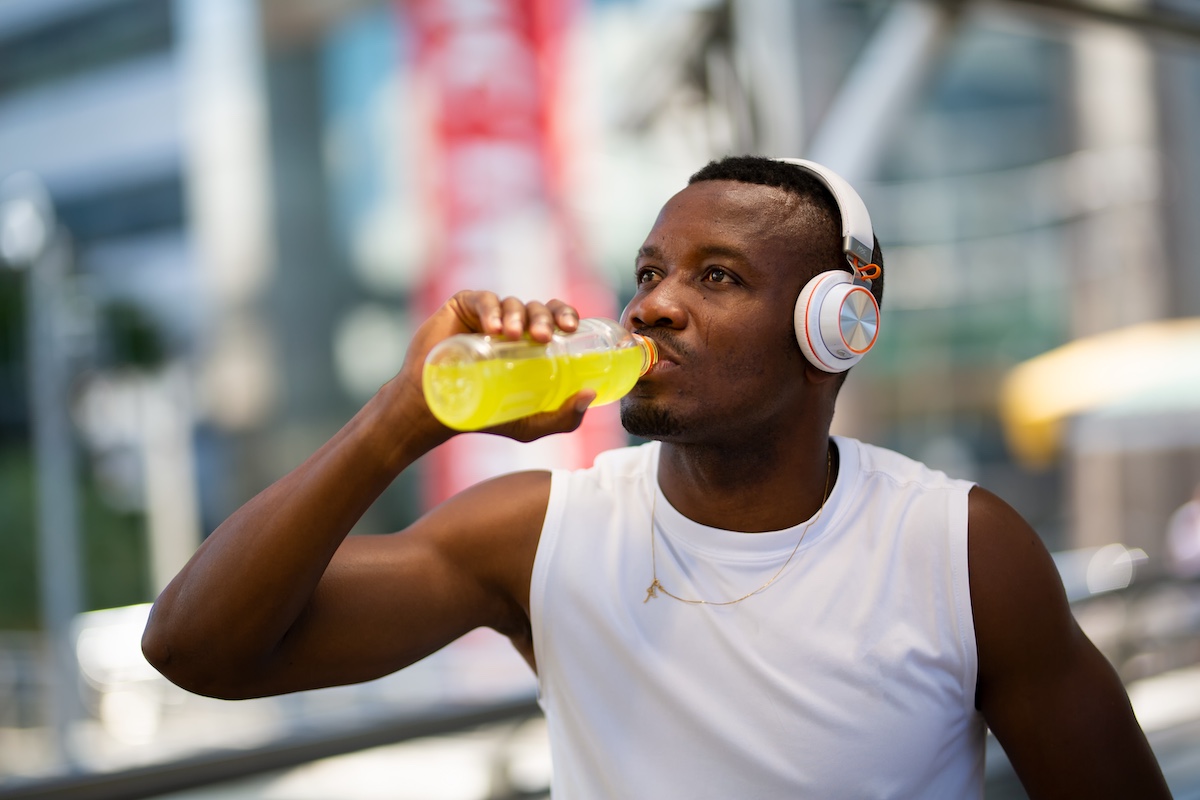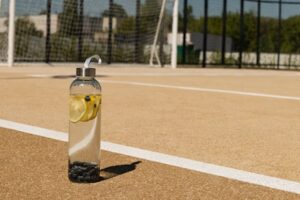
17 Jun Are Sports Drinks Hurting Your Teeth?
Sports drinks have become a go-to beverage for athletes, fitness enthusiasts, and even casual exercisers looking to stay hydrated and replenish electrolytes. With their bright colors, refreshing flavors, and promises of enhanced performance, it’s easy to see why they’re so popular.
However, what many people don’t realize is that these drinks may be causing more harm than good, especially when it comes to oral health.
In this blog post, we’ll explore how sports drinks affect your teeth, what ingredients are to blame, and how you can protect your smile while staying active.
What’s In a Sports Drink?
Sports drinks are designed to replenish fluids and electrolytes lost during exercise. Most contain a combination of water, electrolytes like sodium and potassium, carbohydrates in the form of sugars, and flavoring agents.
While these ingredients can help maintain hydration and energy, they also create the perfect storm for tooth damage.
The two biggest culprits in sports drinks when it comes to dental health are:
- Sugar: A primary energy source in many sports drinks, sugar feeds the bacteria in your mouth. These bacteria produce acids as a byproduct, which can erode tooth enamel.
- Acid: Many sports drinks have a low pH to improve shelf life and flavor. Acidic beverages soften tooth enamel, making it more vulnerable to erosion and decay.
When combined, sugar and acid create an environment that accelerates enamel breakdown, increasing the risk of cavities, sensitivity, and other dental issues.
How Sports Drinks Damage Your Teeth
The effects of sports drinks on oral health are surprisingly severe. Here’s a closer look at the main problems these beverages can cause:
1. Enamel Erosion
Tooth enamel is the hard, protective outer layer of your teeth. Once it’s damaged, it can’t regenerate. The acids in sports drinks lower the pH of your mouth, softening enamel and making it more prone to wear. Over time, frequent exposure to acidic drinks can thin enamel, leaving teeth sensitive, dull, and more susceptible to decay.
2. Increased Risk of Cavities
When sugars in sports drinks interact with oral bacteria, acid is produced as a byproduct. This acid attacks the teeth, leading to demineralization of the enamel. If left unchecked, this can result in cavities, which may require fillings, crowns, or even root canals in severe cases.
3. Tooth Sensitivity
As enamel wears away and dentin (the sensitive inner layer of the tooth) becomes exposed, you might notice increased sensitivity to hot, cold, or sweet foods and drinks. Sports drink consumption can worsen this issue, making everyday activities like drinking cold water uncomfortable.
4. Dry Mouth
Some sports drinks contain caffeine or high sodium levels, which can contribute to dry mouth. Saliva plays a crucial role in neutralizing acids and washing away food particles and bacteria. Reduced saliva flow can heighten the risk of cavities and gum disease.
Are Sugar-Free Sports Drinks Any Better?
You might think switching to sugar-free or low-calorie sports drinks is a safer option for your teeth, but the truth is, they’re not much better.
While these alternatives may not contain sugar, they are still highly acidic. The low pH levels in sugar-free versions can continue to erode enamel over time, leading to many of the same dental concerns.
Additionally, artificial sweeteners and acidic flavor additives can disrupt the balance of bacteria in your mouth, potentially increasing the risk of oral health issues. Some sugar-free options also contain citric acid, which is particularly harsh on enamel, even in small amounts.
Regular exposure can leave your teeth feeling sensitive and more vulnerable to staining. It’s important to read labels carefully and moderate your intake of these seemingly healthier alternatives.

Who’s Most at Risk?
Certain groups of people are more likely to experience dental problems related to sports drink consumption, including:
- Athletes and Fitness Enthusiasts: Those who frequently drink sports beverages during workouts and competitions.
- Teens and Young Adults: Younger people tend to consume these drinks in higher quantities, and developing teeth can be especially vulnerable.
- Individuals with Existing Dental Issues: Anyone with a history of cavities, enamel erosion, or sensitivity is at increased risk.
How to Protect Your Teeth if You Drink Sports Drinks
If you enjoy sports drinks or rely on them during intense physical activity, there are steps you can take to reduce their impact on your oral health:
1. Limit Consumption
Reserve sports drinks for when they’re truly needed, such as during prolonged, intense exercise lasting over an hour. For casual hydration, plain water is a safer, tooth-friendly choice.
2. Rinse With Water Afterward
After drinking a sports drink, rinse your mouth with plain water to help wash away residual acids and sugars. This can help neutralize the pH in your mouth and reduce enamel exposure.
3. Avoid Sipping Over Time
Nursing a sports drink over several hours prolongs acid exposure and increases the risk of tooth damage. Try to consume the drink in one sitting and follow up with water.
4. Use a Straw
Using a straw helps limit the contact sports drinks have with your teeth, reducing acid exposure and the potential for enamel erosion.
5. Maintain Good Oral Hygiene
Brush your teeth twice daily with fluoride toothpaste, floss daily, and visit your dentist regularly for professional cleanings and checkups. This is essential for combating the effects of acidic and sugary drinks.
6. Wait Before Brushing
Avoid brushing your teeth immediately after consuming acidic beverages. Acid softens enamel, and brushing right away can cause further wear. Wait at least 30–60 minutes before brushing to allow your enamel to reharden.
Signs Your Teeth Might Be Affected
If you consume sports drinks regularly, be on the lookout for these signs of enamel erosion and dental damage:
- Increased tooth sensitivity
- Discoloration or yellowing of teeth
- Noticeable rough edges or changes in tooth shape
- Transparent-looking tooth tips
- Cavities or small holes in your teeth
- Dry mouth or frequent bad breath
If you experience any of these symptoms, schedule a dental appointment for an evaluation and personalized care plan.
Are There Healthier Alternatives?
Yes — if hydration and electrolyte balance are your goals, several alternatives can serve you better without harming your teeth:
Plain Water
The best way to hydrate without any adverse effects on oral health. Water helps rinse away food particles, sugars, and acids that can harm your enamel. It also keeps your mouth moist, reducing the risk of dry mouth and bacteria buildup.
Coconut Water
Contains natural electrolytes with less acidity than most sports drinks. It’s a refreshing, hydrating option that’s gentler on your teeth while still offering essential minerals. Just be mindful to choose unsweetened versions to avoid added sugars.
Electrolyte Tablets/Powders
Some dissolvable products are sugar-free and have a neutral pH, making them less harmful to teeth. These can be a convenient, tooth-friendly option for staying hydrated during workouts or hot weather. Always check the label for added sugars or acidic flavoring agents.
Homemade Sports Drinks
Control ingredients by making your own beverage with water, a pinch of salt, and a splash of natural fruit juice for flavor. This way, you can limit acidity and sugar while still getting a boost of electrolytes. It’s a customizable, affordable alternative that’s much easier on your enamel.




Sorry, the comment form is closed at this time.